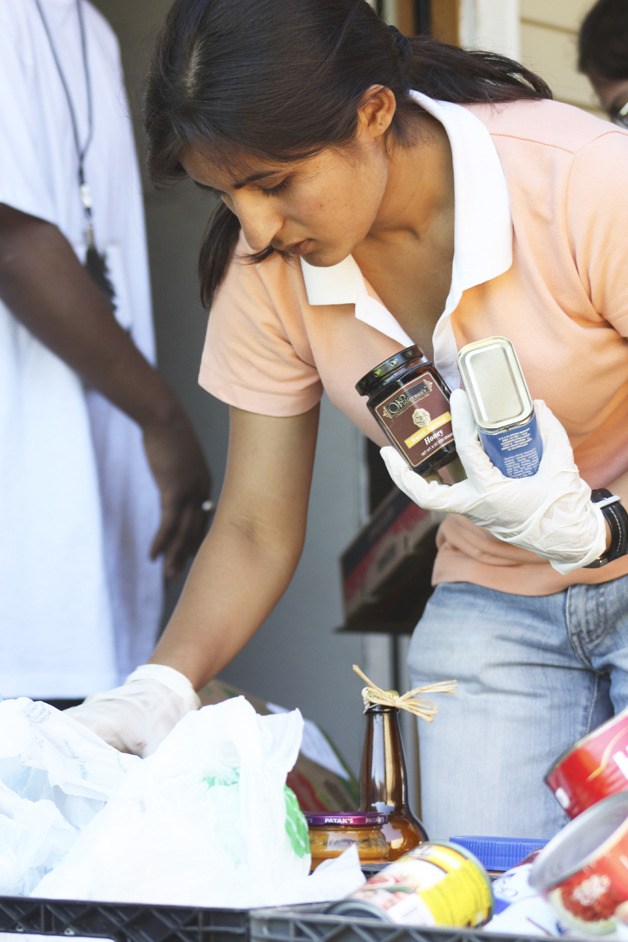Cans of tuna, jars of peanut butter and boxes of cereal pass from hand to hand. A black hijab flutters in the doorway, the woman wearing it reaching into a cardboard box for more.
It’s 9:30 a.m. at the Auburn Food Bank, and a group of energetic young women have formed an assembly line of sorts. Chatting in perfect English, albeit with various accents, they toss food into milk crates and paper bags.
The U.S. Department of State selected these women, who hail from Pakistan, Afghanistan and India, to travel to America for a five-week intensive in women’s leadership that began in late June. Hosted by Green River Community College, the Study of the U.S. Institute (SUSI) for Student Leaders fosters a greater understanding of the United States and teaches young women lessons and skills they can bring home.
“It’s kind of like knowing your neighbors,” said 20-year-old Sarvar* of India. “You have these neighbors and you never say hi to them, but then you invite them to dinner one day and you’re like, ‘OK, they have a story too.’”
Today, they are learning about helping those in need. In Pakistan, Sahar, 22, stays busy studying medical imaging and learning to diagnose diseases like cancer. Like many Americans, she grapples with not having enough time to do good in her community.
“Sometimes when you’re so busy in your life, you completely stop being bothered by who needs education, who needs food, who needs your help,” Sahar said. “Now you have to think that it’s about others, too, and about making life better for others.”
In their third week, realizations of how similar America is to their own countries have become surprisingly frequent. Razia, a native of Afghanistan, thought Americans were unfriendly and inhospitable before she came here. Even though Americans don’t have generations of extended family living under one roof, as many in Afghanistan do, Razia, 25, found that we have the same strong familial ties.
“Though the children are living separate from their parents, they come over and see their parents regularly,” she said. “Honesty between wife and husband, having respect for each other and taking care of the children is the same as we have in our homes.”
Local student ambassadors encourage these discoveries. They travel with the SUSI women, keeping everyone on track with the schedule and offering tidbits about what life is like for young people in America.
“We have different views and understandings of things, so we’re there to provide another view,” said Cara Call, 20, a student ambassador from Kent.
GRCC leads way
This is the fourth year GRCC has hosted SUSI student ambassadors, and the first year it has participated in the all-women leadership program. It is the only community college in the country that hosts SUSI students, and one of just two colleges honored with hosting only women.
This also is the first year Afghanistan has been included in the program. For Susan, the stars aligned. She applied through the U.S. Embassy in Afghanistan after her friend mentioned the program. After interviews, questions and a lot of writing, Susan never thought she’d be selected. She now plans to apply for a Fulbright scholarship to study in the United States for her master’s degree.
As a student studying journalism in Afghanistan, she feels pressure against female leadership every day.
“In Afghanistan being a journalist is really a challenge, especially for a woman, because if you become popular you can become a target,” she said. “But someone should start this challenge. Someone should do this job.”
In Pakistan, issues facing women run deep into their culture. Sahar stresses the importance of women in her line of study, the medical field. Because Pakistani women are taught to be shy, they won’t go to a male doctor for a mammography or any other private procedure.
“Women don’t come for a check-up because they know it’s a man doing it,” she said. “If they know it’s a woman who’s going to treat you and diagnose you, they will feel more comfortable and the disease can be eradicated. So it’s very important for women to be in the health sector.”
Though some issues manifest because of cultural practices, the SUSI women have learned that they face some of the same issues as women here.
“The nature of our problems is the same all over the world,” Susan said. “One of the problems is now women are working individually. If they come together to share their thoughts and ideas, they can be more successful.”
Dr. Barry Bannister, the program’s director at GRCC, has high hopes for this.
“Our approach is to use education as a way of changing minds, particularly those of the next generation,” he said. “When they see an opportunity, when they see a door that’s half open, I want them to be able to walk through it.”
====
* Only the first names of the SUSI ambassadors are listed to protect their identity.
Summer intern Rebecca Nelson, an Auburn High graduate, is a student attending the Northwestern University Medill School of Journalism.



